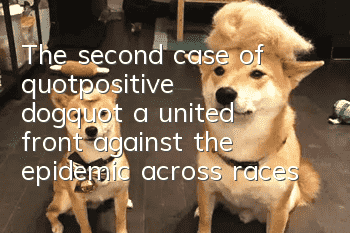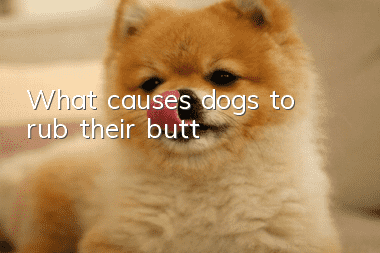The second case of "positive dog", a united front against the epidemic across races!

A few days ago, the world's first pet dog that tested weakly positive for the new coronavirus died. It was a 17-year-old squirrel dog whose owner was diagnosed with the new coronavirus. Yesterday (March 19), there was a second case of a pet dog testing positive for the new coronavirus. This time it was a German wolfdog.
Screenshot of Hong Kong government press release
This incident still happened in Hong Kong, and the situation was similar to last time. The dog owner was also unfortunately diagnosed with the new coronavirus. The German wolfdog and another Tang dog were sent to the Hong Kong-Zhuhai-Macao Bridge port Animal shelters undergo testing.
One of the German wolfdogs tested positive after repeated tests, and the other Tang dog tested negative. However, neither of the two dogs showed symptoms related to the new coronavirus pneumonia.
The veterinarian will take samples and blood from the German wolfdog to check whether there are antibodies in the blood. The virus gene of the German wolfdog is completely consistent with that of the confirmed person. It is very likely that the dog owner passed the virus to the dog.
Tang dogs that live together and have close contact are not infected. There is currently no evidence that the virus can be passed from one dog to another.
Judging from the current epidemic prevention situation in various places, the new coronavirus has spread widely, but no pet dogs have been found to have clinical symptoms or death. Therefore, the possibility of dog-to-dog and dog-to-human transmission is unlikely, and evidence is still needed to support it.
Let’s take a look at the 17-year-old dog who passed away after going home after 9 tests and 17 days of quarantine. The death of this dog not only failed to silence the topic, but also led to more accusations and abuses against Zhou Qiaoer...
Regarding the first squirrel dog infected with the new coronavirus that died two days after being returned to the owner, Xue Hanzong said that the squirrel dog was tested negative twice and was still very active when it was returned to the owner. Although the cause of death of the squirrel dog has not been examined, it is older and has many physical problems. It is believed that the death is related to other causes and has nothing to do with the new coronavirus.
During this period, both the owner and the elderly dog were under too much pressure. They no longer want to be used as a tool, so we should give them some peace and quiet.
Under this trend, dogs may also be infected with the virus. Although there is no evidence that it will be transmitted to humans, pet families must take complete protection during the epidemic and let the dogs spend the critical moment with us instead of abandoning them.
Is it appropriate to take pets out during the epidemic?
The editor's idea is of course not to go out as much as possible, but spring is coming back to the earth, and the epidemic prevention and control situation is stabilizing and improving. I can't help being such a stay-at-home person, and many people are starting to take their pets out to bask in the sun...
Then protective measures must be arranged:
When you go out to walk your dog, be sure to wear a leash on your dog.
Wear a mask yourself and walk your dog in a civilized manner.
Don’t let the dog lick randomly. You can wear a muzzle on the dog.
Don’t come into contact with other animals, and don’t let pets come into close contact with other people.
Do not take pets to markets, especially places with live poultry.
Don’t touch stray animals casually.
After returning home, give your cat and dog a thorough bath. Daily bath products will suffice.
But wearing a mask when going out is really sultry in this weather~ The editor went out for a trip and really just wanted to breathe fresh air at home.
Things to note when raising pets during the epidemic
Do a good job in cleaning the environment. During special times, ventilate the home more.
Regularly use disinfectant to clean the floor and pet daily necessities, such as cages, nest mats, food and water basins, traction ropes, etc.
Use pet-safe disinfectants. These disinfectants are non-toxic to humans and animals, and will not be fatal even if pets accidentally lick them.
Pay attention to the health of dogs and cats, prevent diseases in daily care, and reduce the chance of going to the veterinary clinic at this time.
Do not abandon or harm dogs and cats, meet their basic needs, do appropriate protection and cleaning work, protect the health of yourself and your pets, and achieve "responsible pet raising".
During the epidemic, pets are left at home without anyone to take care of them?
During the epidemic control period, many people left their pets alone at home because it was inconvenient to carry them back to their hometowns, and prepared enough food and water for them. However, due to the sudden outbreak of the epidemic, most people's return journeys were delayed, which directly led to insufficient food and water for pets, and many pets faced the possibility of death.
Regardless of whether you will be away for a day or a week, you must arrange your pet’s food and drinking water in advance.
If you leave your pets for more than two days, please send your pets to the homes of relatives and friends to take care of them in advance, or ask relatives and friends to take care of them at home every other day.
If there are no acquaintances, pet owners can try to seek help from their communities and properties nearby.. You can also contact local animal protection agencies and veterinary clinics.
What to do with stray cats and dogs during the epidemic?
During the current epidemic, the treatment of stray cats and dogs has been at the forefront.
Although there is no evidence that cats and dogs can be infected with the new coronavirus, there is also no evidence that they will not. Dr. Dingxiang’s refutation of the rumor also characterized whether pets can infect humans as questionable. In other words, pets may become intermediate hosts.
But there is absolutely no need to kill stray animals. This is an extreme act of animal cruelty, which can only aggravate people's misunderstanding of pets, cause unnecessary panic, increase the number of abandoned pets, and make the management of stray animals even worse.
Try to avoid contact with stray cats and dogs. Their contact range is uncontrollable and the risk is greater.
The best way to rescue stray cats and dogs is to adopt them, rather than irresponsibly abandoning them. Irresponsible feeding will only increase their numbers.
Abandoned cats and dogs with health problems are sent to the hospital for treatment.
Rescued dogs with no health problems are sent to foster homes for foster care.
I hope people can stay rational and eventually defeat the epidemic.
Please remember: We should never lose our humanity at any time and under any circumstances.
Calling everyone: During the epidemic, restrain yourself and avoid contact with strangers and strange animals. This is the best protection for these stray animals and your own pets!
- Do you know how to take care of your dog during its period? Here are a few things you must know!
- What are the symptoms of Teddy fever?
- What are the causes of vomiting and diarrhea in puppies? How to deal with them?
- What's wrong with a puppy spitting water after drinking it?
- How to train a Bichon Frize? Teach you how to easily train a Bichon Frize to hold things!
- Schnauzer fever symptoms and treatments
- How to treat Schnauzer ear mites?
- What should I do if my Doberman dog eats too much and has diarrhea?
- Do you know the meanings of different movements of a dog’s tail?
- How to treat canine distemper in dogs



